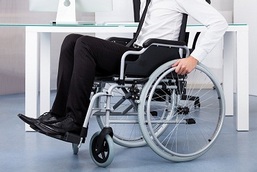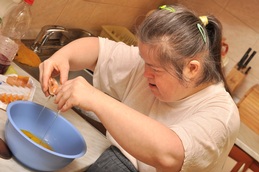One million found fit-to-work announcement plays into narrative ‘disabled people are cheating the system’
 The Government has been accused of a ‘deceptive use of statistics’ about the number of disabled people found fit for work through Employment and Support Allowance (ESA) assessments.
The Government has been accused of a ‘deceptive use of statistics’ about the number of disabled people found fit for work through Employment and Support Allowance (ESA) assessments.
Nearly one million of all new applicants for Employment and Support Allowance (ESA) were assessed as being fit for work between October 2008 and March 2013.
Analysis from the Department for Work and Pensions also showed more than one million others withdrew their claim before reaching a face-to-face assessment. Applicants might have recovered and returned to work during this time or started claiming for a more appropriate benefit.
Minister of State for Disabled People Mike Penning said: “As part of the Government’s long-term economic plan, it is only fair that we look at whether people can do some kind of work with the right support – rather than just writing them off on long-term sickness benefits, as has happened in the past.
“With the right support, many people with an illness, health condition or disability can still fulfil their aspiration to get or stay in work, allowing them to provide for themselves and their family.”
However disability campaigners, Disability Rights UK, has criticised the Work Capability Assessment (WCA) which asses people eligibility for ESA, saying it is an unfair test which has led to the implication that disabled people are cheating the benefits system.
Philip Connelly policy manager at Disability Rights UK said of the statistics:
“It was a five years total and it didn’t include a further breakdown to show that many people had stopped their claim because they had made a recovery, no longer needed the benefit and returned to work.
“It is a deceptive use of statistics, and this announcement plays into the narrative that disabled people are cheating the system, and that is very dangerous.
“Stories on the WCA carry with them the implication that disabled people are cheating the system the truth is that the test is unfair.
Other consequences flow from this injustice: You cannot allow the suggestion to arise that disabled people are workshy, feckless or possibly fraudulent and then expect employers to want to take them on.
“You cannot permit a negative view of disabled people to be the norm and then not think that some members of the public will not think that they are fair game for abuse or even physical violence.
“You compound many disabled people’s negative outlook and add to the likelihood that some will become further depressed.”
Disability charity Scope has called for the Government to put more focus on the quality and help given to disabled people applying for work, instead of using WCA as a way to get people off of benefits.

Richard Hawkes, chief executive of the disability charity Scope said:
“The WCA should be more than an exercise in getting people off of benefits. It should make sure disabled people get the specialist, tailored and flexible support they need to find and keep a job.
“The fit for work results are only half the story.
“We should be talking about getting a million more disabled people into work.”
As part of its long term economic plan to build a stronger economy, the Government has said it has been reforming the benefits system by providing ESA for those unable to work, and helping those declared fit to find work.
As part of a long term economic plan, the Department for Work and Pensions is rolling out its Disability Confident roadshow across the UK to help and encourage employers to hire disabled people and showcase the talents and potential of disabled people for the British economy.
The two year campaign is backed by major employers such as Sainsbury’s, KPMG, Barclays, Honda and Asda.
Employment rates for disabled people have been gradually rising to reach 45 per cent, but Scope criticised this number, saying it is not high enough and more work needs to be done.
Mr Hawkes continued: “Disabled people are pushing hard to find jobs and get on in the workplace. Nine in ten disabled people work or have worked. Yet only about 50 per cent of disabled people have a job right now.
“We need to make sure that as the economy picks up disabled people are not left behind. We’ve got to start by supporting more disabled people to find and stay in work.
"They face massive challenges when it comes to finding and staying in work – too often they don’t get the right kind of support and work places are still not flexible enough.
“Instead the test is beset with problems including high rates of successful appeals, assessors resigning and public criticism from the Public Accounts Committee and National Audit Office. We have also witnessed shocking undercover footage of how Atos assessors are trained and heard horror stories of disabled people inappropriately found fit to work.”
During the test to assess people’s eligibility to receive ESA, applicants are required to answer a series of questions to understand their levels of physical and mental, cognitive and intellectual functions.
Mr Connolly of Disability Rights UK has highlighted some of the questions to argue the test is unfair. The first question asks applicants ‘Can you go up or down two steps without help from another person, if there is a rail to hold on to?’

Mr Connolly said of the question: “So you could do 3 steps and not get the points. Most employers would want people to manage flights of steps if the lift didn’t work.”
Question 9 asks ‘Do you have to wash or change your clothes because of difficulty controlling your bladder, bowels or collecting device?’
Responding to this question Mr Connolly said: “So it is possible for a person to be found fit for work, put in a work environment where they might soil their clothes but provided that this isn’t more than once a month this is acceptable to an employer.”
Mr Connolly concluded: “I urge people themselves to go online and read the test for themselves, to decide if it is fair and come to their own conclusions.”
To find out more about the ESA questionnaire visit: http://www.disabilityrightsuk.org/employment-and-support-allowance-overview
Vote on whether you think the Government is implying disabled people are cheating the benefit system here:www.homecare.co.uk/news/article.cfm/id/39/is-government-implying-disabed-people-cheating-benefit-system
Latest News Analysis
 04-Sep-19
Extra £1.5 billion announced for social care in Chancellor's Spending Review
04-Sep-19
Extra £1.5 billion announced for social care in Chancellor's Spending Review
 02-Jul-19
Department of Health forced to rethink care homes' nursing rates after legal challenge
02-Jul-19
Department of Health forced to rethink care homes' nursing rates after legal challenge
 18-Jun-19
Overnight care workers forced to sleep in offices and told 'bring your own bedding'
18-Jun-19
Overnight care workers forced to sleep in offices and told 'bring your own bedding'
 14-Jun-19
Back in the closet: Third of care home staff have had no LGBT+ awareness training
14-Jun-19
Back in the closet: Third of care home staff have had no LGBT+ awareness training
 11-Jun-19
PM candidates on social care: Rory Stewart calls fixing care an 'unfinished revolution'
11-Jun-19
PM candidates on social care: Rory Stewart calls fixing care an 'unfinished revolution'